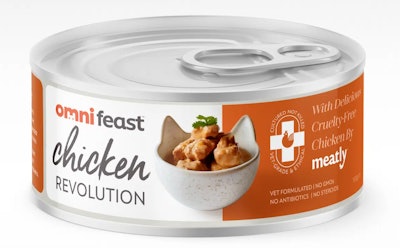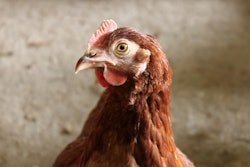
Meatly, a UK-based cultivated meat company, said it has created the world’s first cans of pet food that use cultivated chicken as the protein source.
The product was created in collaboration with its brand partner, Omni, a novel protein pet food company in the UK, founded by veterinarian Dr Guy Sandelowsky.
Meatly said in a statement that this is a significant step in its B2B route to market, as it looks to become both the first company in the world to sell cultivated meat for pets and the first to gain regulatory approval and sell cultivated meat-based products in the UK and Europe.
According to Meatly's website, the cultivated meat is created through a three-step process, beginning with a small sample of cells taken from a chicken egg. "After this, we never use another animal product in our production, ever," said the site.
The company provides all the vitamins, minerals and amino acids the cells need to grow. The cells are nutured in a container that controls temperature and acidity.
Cultivated meat as an ethical, sustainable option
For Omni, which has achieved more than £2 million (US $2.5 million) in sales to date selling dog food crafted from pulse, algae and yeast protein diets, this first venture into the cultivated meat market comes in the form of canned wet food for cats. By using Meatly’s cruelty-free chicken ingredient, this step represents an evolution of the pet food market as pet food brands, like Omni, look to offer ethical and more environmentally-friendly products that are healthier for pets, said Meatly in a statement.
Dr Guy Sandelowsky at Omni, said Meatly’s ingredient represents a virtually infinite, cruelty-free source of meat which can be optimized for health.
"This means more essential vitamins, minerals and omegas, and an elimination of the troublesome components that can be found in traditional meat, such as antibiotic residues," said Sandelowsky. "We see the ingredient of particular importance to the cat food market, which lacks credible alternative protein solutions currently.”
The company said it also marks a big moment for the wider pet food industry, which is growing 7% per annum globally and is expected to be worth £120 billion (US $153 billion) by 2026. With this growth, however, the industry’s environmental impact is increasing rapidly. Of the meat currently consumed in the UK, 22% is consumed by pets, representing a significant amount of GHG emissions. Meatly said it addresses this by producing sustainable, tasty and nutritious meat, whilst reducing the reliance on industrial agriculture.
“As demand continues to grow, with pet food already accounting for 20% of meat produced globally, so too does the industry’s environmental impact," said Owen Ensor, cofounder and CEO of Meatly. "Cultivated meat gives pet parents an easy choice – high quality, tasty, nutritious, and sustainable pet food. We’re thrilled to work with innovative companies like Omni to make this a reality as soon as possible.”
Regulatory approval still needed
The company is working with the UK’s Food Standards Agency and Department for Environment Food & Rural Affairs. Any products sold in the UK will be approved by both agencies, it said.
Once its product has been granted regulatory approval, through partnerships with retailers and manufacturers like Omni, Meatly-produced pet food will be available in shops across the country. As an early investor in Meatly, Pets at Home plans to be the first retailer to offer these products in its stores, said Ensor.
"It is incredibly exciting to see the first ever cans of cultivated pet food fly off the production line," he said. "This is a major milestone for cultivated meat globally and shows that we are ready to sell product.”
David Wainwright, commercial director at Pets at Home, said they are looking forward to being the first retailer to offer these products in their pet care centers.
"While it is still early days, we are committed to helping drive change in the industry and finding sustainable alternatives to replace some of the protein used globally in pet food would be a major step forward," said Wainwright.
BioCraft introduced cell-cultured slurry last summer
Last June, BioCraft Pet Nutrition introduced a chicken cell line for both cat and dog foods. The cell-cultured chicken comes as a meat slurry, which according to BioCraft founder and CEO Shannon Falconer, Ph.D., is an ingredient format that pet food manufacturers are already familiar with. Other benefits of the chicken cell slurry line include offering a superior nutritional profile to tissue alone; being highly scalable; and not requiring any downstream processing, said Falconer.
Likewise, cell-cultured chicken slurry may be on par with conventional poultry meat in terms of its carbon footprint.
“The primary objective of BioCraft Pet Nutrition is to provide pet food manufacturers with a meat ingredient whose nutritional profile is most appropriate for our pets,” said Falconer at the time of the introduction.
As opposed to creating whole-muscle meat, cell-cultured chicken slurry may overcome economic and technical challenges faced by lab-grown meats while providing amino acids and other nutrients for pet food.



















